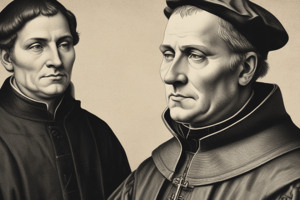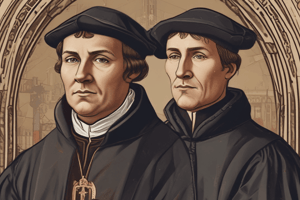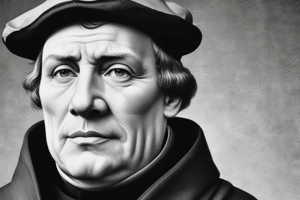Podcast
Questions and Answers
What primary concept did Martin Luther advocate as the foundation for salvation?
What primary concept did Martin Luther advocate as the foundation for salvation?
- Faith alone and scripture alone (correct)
- Rituals and community involvement
- Works and sacraments
- Tradition and church authority
What was one significant result of Martin Luther's translation of the Bible into German?
What was one significant result of Martin Luther's translation of the Bible into German?
- It unified the Catholic Church's teachings.
- It diminished the importance of tradition.
- It led to the closure of monasteries.
- It made scripture more accessible to the general public. (correct)
What social movement during the late medieval period contributed to the questioning of traditional authority?
What social movement during the late medieval period contributed to the questioning of traditional authority?
- The Enlightenment period
- The Renaissance and humanism (correct)
- The Reformation movement
- The Feudal system's decline
Which of the following practices by the Catholic Church was most criticized by Martin Luther?
Which of the following practices by the Catholic Church was most criticized by Martin Luther?
What was one of the outcomes of the Protestant Reformation instigated by Martin Luther?
What was one of the outcomes of the Protestant Reformation instigated by Martin Luther?
What was the primary purpose of the Diet of Worms convened in 1521?
What was the primary purpose of the Diet of Worms convened in 1521?
Which of the following best describes Luther's stance on salvation?
Which of the following best describes Luther's stance on salvation?
What was the outcome of the Edict of Worms issued by Emperor Charles V?
What was the outcome of the Edict of Worms issued by Emperor Charles V?
What significant shift did the Protestant Reformation contribute to in Europe?
What significant shift did the Protestant Reformation contribute to in Europe?
Which of the following works was authored by Martin Luther?
Which of the following works was authored by Martin Luther?
Flashcards are hidden until you start studying
Study Notes
Religious Reform
- Initiated by Martin Luther in 1517 with the "95 Theses."
- Criticized the sale of indulgences and questioned papal authority.
- Advocated for faith alone (sola fide) and scripture alone (sola scriptura) as the basis for salvation and authority.
- Emphasized personal faith and direct relationship with God.
Martin Luther's Influence
- A German monk and theologian, key figure in the Reformation.
- His writings spread rapidly due to the printing press, influencing public opinion.
- Translated the Bible into German, making it accessible to the laity.
- Established Lutheranism as a distinct branch of Christianity.
Historical Context
- Late medieval period marked by corruption within the Catholic Church.
- Growing discontent among the populace regarding clerical abuses and the wealth of the Church.
- Humanism and Renaissance ideals encouraged questioning of traditional authority.
- Political fragmentation in Europe allowed for the spread of reformist ideas.
Catholic Church Practices
- Sale of indulgences: financing church projects by offering forgiveness of sins.
- Clerical corruption: practices such as simony (selling church offices) and nepotism.
- Reliance on sacraments as a means of grace, which Luther contested.
- Focus on rituals over personal faith and understanding of scripture.
Impact On The Protestant Reformation
- Sparked widespread religious upheaval across Europe.
- Led to the formation of various Protestant denominations (e.g., Lutheranism, Calvinism).
- Resulted in the Catholic Counter-Reformation, attempting to reform and reaffirm Catholic doctrines.
- Altered the course of Western Christianity and influenced social, political, and cultural changes.
Religious Reform
- Martin Luther's "95 Theses," posted in 1517, challenged the Catholic Church's practices.
- Criticism of the sale of indulgences highlighted the financial exploitation of believers.
- The principles of faith alone (sola fide) and scripture alone (sola scriptura) became foundational for Protestant belief.
- Emphasis on personal faith encouraged individuals to cultivate a direct connection with God.
Martin Luther's Influence
- Luther, a pivotal monk and theologian, played a significant role in initiating the Protestant Reformation.
- The invention of the printing press allowed his ideas to disseminate quickly, influencing widespread public sentiment.
- His German translation of the Bible increased accessibility for the general population, promoting religious literacy.
- Lutheranism emerged as a unique branch within Christianity, shaping the religious landscape in Europe.
Historical Context
- The late medieval period experienced significant corruption within the Catholic Church, fueling public dissatisfaction.
- Clerical abuses and the Church's wealth led to increasing resentment among the populace.
- Renaissance humanism encouraged individuals to question established authorities and traditional beliefs.
- Europe’s political fragmentation facilitated the adoption and spread of reformist ideas.
Catholic Church Practices
- The sale of indulgences served as a revenue source for funding Church projects, undermining spiritual integrity.
- Clerical corruption included practices such as simony and nepotism, eroding trust in Church leadership.
- Luther contested the reliance on sacraments as the exclusive means of grace, advocating for personal faith instead.
- The Church's focus on rituals overshadowed genuine understanding of scripture and spiritual growth.
Impact On The Protestant Reformation
- Luther's actions catalyzed a significant religious upheaval, leading to the rise of Protestantism across Europe.
- Various Protestant denominations, including Lutheranism and Calvinism, were established as alternatives to Catholicism.
- The Catholic Counter-Reformation sought to address and rectify issues within the Church while reaffirming its doctrines.
- The Reformation fundamentally changed Western Christianity, influencing broader social, political, and cultural developments.
Historical Context
- Convened in 1521 in Worms, Germany, to address the Protestant Reformation.
- Martin Luther presented his 95 Theses, which criticized the Catholic Church's practices, particularly indulgences.
- Luther's refusal to recant his views at the Diet marked a pivotal moment in religious history.
Religious Implications
- Luther's doctrine emphasized justification by faith alone, opposing Catholic emphasis on good works for salvation.
- The Diet raised questions regarding the Pope’s ultimate authority over religious matters and biblical interpretation.
- Luther's excommunication further divided Christianity into distinct Protestant and Catholic factions.
Treaties and Resolutions
- The Edict of Worms, issued by Emperor Charles V, declared Luther an outlaw and labeled his writings as heretical.
- Key figures, particularly Frederick the Wise, provided protection to Luther, allowing his reformative work to progress.
- The events at Worms set a precedent for religious conflicts and eventually led to the Peace of Augsburg in 1555.
Political Consequences
- Resulted in the formation of Protestant states within Germany, changing the political landscape.
- The authority of the Catholic Church diminished, while local rulers gained increased power and autonomy.
- Sparked a series of conflicts known as the Wars of Religion, primarily between Catholic and Protestant groups across Europe.
Martin Luther
- Luther is a central figure in the Protestant Reformation, challenging established Catholic doctrines.
- Key writings include the "95 Theses," "Address to the Christian Nobility," and "The Babylonian Captivity of the Church," which articulated his theological positions.
- His legacy influenced the development of modern Protestant denominations and significantly altered Christianity and European society.
Studying That Suits You
Use AI to generate personalized quizzes and flashcards to suit your learning preferences.




